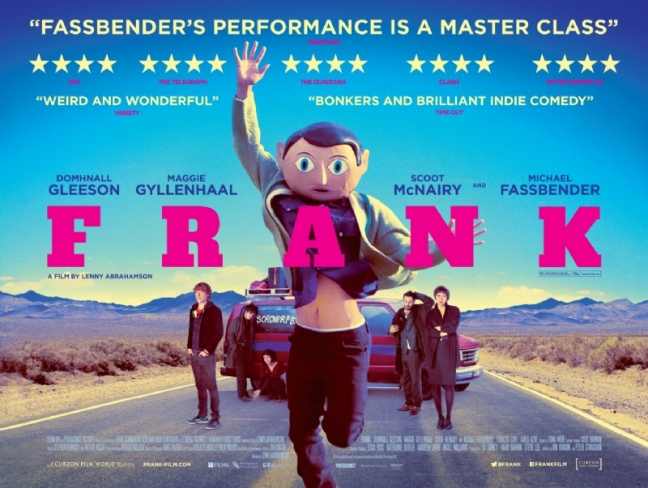
It seems like covering up Michael Fassbender’s face for an entire movie is killing the golden goose. Aside from his devilish good looks, Fassbender’s control and precision in facial expression has made him one of the most premier and versatile actors in our generation. So while a bold choice to hide Fassbender in mask, it does little hide this quirky gem of a film.
Inspired by the comic persona Frank Sidebottom, the film documents the fictional band Soronprfbs, featuring a gaggle of off-beat characters including the deliciously abrasive Clara (Maggie Gyllenhall, White House Down, Crazy Heart) and of course the titular, charismatic, and paper-mache-head doning Frank (Michael Fassbender, X-Men Franchise, 12-Years A Slave). A musician wannabe Jon (Domhnall Gleeson, Harry Potter Franchise, Anna Karenina), becomes enthralled by the peculiar yet brilliant methods of Frank and Soronprfbs and joins the band.
“Frank,” much like it’s titular character, is quite the oddball and sure to draw a polarizing reception. A general audience can find comfort in the film aligning itself pretty recognizably within the “I’m in the Band” genre. It’s that familiarity that is sure to tether its audience to the film as it take strange and bizarre turns along the way. But the true rewards of the film lies in it’s biting script doused in black comedy. For those who have that acquired taste will be charmed and be able to feel the heartbeat that lies underneath a rather peculiar exterior.
We look at the Soronprfbs as outsiders looking in and as the film hums along we become attached to this group of outcasts. Director Lenny Abrahamson (What Richard Did, Garage) is able to deconstruct the caricatures that we initially see in these characters and reveal painfully vulnerable elements. Maggie Gyllenhall and Michael Fassbender perfectly encapsulate this sentiment in their performances with Gyllenhall playing a prickly cynic masking a romantic and Fassbender playing genius masking a humble artist.
The biggest flaw of the film would have to be it’s focus on Jon rather than the rest of the band. While Soronprfbs represents everything we love about musical expression, Jon is the complete opposite. His petty and selfish attempts at stardom make him unsympathetic at best and leave us with less emotional heft from the film than we would have hoped for.
It’s a celebration of weirdness and a fresh change of pace that’ll keep your cinematic noggin sharp. “Frank” is a challenging film, but still maintains it’s charm for those who will appreciate it. I know I’ll be itching for another viewing down the line as I relish the the chance to laugh and grapple with it once more. It’s certainly not going to please everyone, but that’s just something you’re going to face for yourself.








